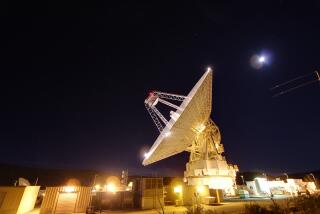Space Programs Head to Crossroads : Exploration: U.S. could dominate in manned flights or see its program collapse, panelists say. The military is expected to play a greater role.
SAN DIEGO — The character of space exploration is changing dramatically as nations with major programs grapple with rising costs and shrinking budgets. And it seems likely that some past alliances will fall apart and the military will play an expanding role in the use of space, experts from around the world said here this week.
For example, the Soviet Union has severely curtailed its space program, and Europeans are growing increasingly uneasy with their cooperative ventures with the United States. This nation could either seize world leadership or watch its manned space program collapse.
Those conclusions emerged during an international conference at UC San Diego sponsored by the university’s Institute on Global Conflict and Cooperation, the California Space Institute and Los Alamos National Laboratory’s Center for National Security Studies.
Top scientists from every major space program voiced concerns over the rising cost of space exploration and the difficulty of justifying such costly ventures as sending humans to Mars.
The rapid rate of change has been demonstrated most clearly by the dramatic scaling back of the Soviet program, which in some ways has taken the lead from the United States with a permanent manned orbiting laboratory and ambitious plans to put cosmonauts on Mars by 2010.
“Two years ago, it was much different than today,” said Albert Galeev, director of Moscow’s Space Research Institute. “There was much enthusiasm for a Mars mission.”
But economic and political turmoil in the Soviet Union has brought an end to all discussion of a manned expedition to Mars, said Galeev, who directs his nation’s unmanned space program. Furthermore, the Soviet space shuttle, built at an enormous cost and flown only in an automated, unmanned configuration, probably will be mothballed. The same fate awaits the pride of the Soviet fleet: the Energia, the world’s most powerful rocket.
That leaves the Soviet Union with only two approved space programs, Galeev said: the orbiting Mir space station, which he expects to remain operational and manned, and his institute’s plans to send a robotic mission to Mars in 1994. That mission had originally been planned as a precursor to a manned Mars mission.
The Soviets’ opportunity to send humans to Mars in the foreseeable future “has probably gone,” said John Logsdon, director of George Washington University’s Institute for Space Policy and one of this nation’s leading experts on space. Because neither the Europeans nor the Japanese have shown an inclination for such a costly adventure, if it is to be done by anyone it will have to be done by the United States, Logsdon said.
“This really is an issue of U.S. leadership,” he added. “Do we want to do it?”
Logsdon, a strong supporter of the manned space program, said such a program would be difficult to sell because it is hard enough to justify sending humans into orbit, much less to explore other planets at a cost of hundreds of billions of dollars.
“There’s no reason why we have to send humans into space,” Logsdon said. “One almost has to accept it as part of a basic philosophy: fulfilling human destiny.”
Sending humans to Mars may seem a little unrealistic for the National Aeronautics and Space Administration, which has been plagued by problems ranging from an unreliable shuttle fleet to a proposed space station that will have to be completely redesigned because it grew too expensive and too complex.
Some had feared that the station was so complex that it threatened to plunge NASA into economic and technical chaos. The decision to redesign the station should ease those fears.
Logsdon said here that canceling the station could have led to the “collapse” of the manned program.
“Cancellation of the space station could be the virtual end of U.S. participation in manned space flight,” he said.
It could also end international cooperation in space. Roger Bonnet, chief scientist for the European Space Agency, one of the United States’ partners in the station, said the troubled program is undermining the effort to develop international relationships in space exploration.
“The hesitation of the Americans on the space station does not help us,” Bonnet said. As for future missions, “Maybe we should do it alone or chose another partner.”
Bonnet said the logical way to create international cooperation in major space ventures is to form an agency in which all participants are partners, each contributing from its strengths and each having an equal say in the direction of the program.
That has not been the character of past efforts. NASA considers partnerships acceptable, but it is unwilling to give up control of a mission to an international consortium, Logsdon said.
One survivor of the turmoil undoubtedly will be the military.
“Space has revolutionized what we think of as national security,” said Stanley Rosen, retired head of the Air Force Space Systems Division. “We have just begun to understand how space can be used to support national security.”
Referring to the crisis in the Persian Gulf, Brian Dailey, head of the staff for the Senate Armed Services Committee, said: “Would it be better not to deploy those forces if you could do it from space? You can easily destroy (missile) silos, and even tanks, from space. But is it cost effective?”
More to Read
Sign up for Essential California
The most important California stories and recommendations in your inbox every morning.
You may occasionally receive promotional content from the Los Angeles Times.










